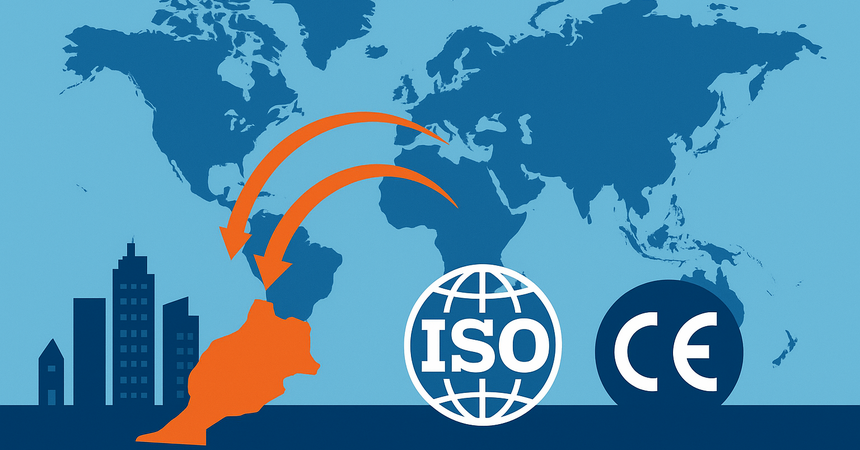Today, Morocco is increasingly referred to as the “gateway to Africa and Europe.” Its geographic location, economic stability, and active foreign trade policy make the country a strategically important destination for business. For manufacturers, it is not only an opportunity to expand exports but also to gain access to a massive market of more than 1 billion consumers—thanks to Morocco’s free trade agreements with the European Union, the United States, and several African countries.
However, the key to successfully entering the Moroccan market is compliance with international quality and safety standards. Without certification, products may face customs barriers, loss of competitiveness, and lack of trust from partners.
Morocco’s Economic and Strategic Potential
Geographic Advantage- Located at the crossroads of Europe, Africa, and the Middle East.
- Major seaports—Tangier Med and Casablanca—are among the largest logistics hubs in the region.
- Only 14 km by sea from Spain, making the country an ideal “bridge” between continents.
- Morocco’s GDP growth in recent years has averaged around 4%.
- Key economic drivers: agribusiness, automotive industry, renewable energy, pharmaceuticals, and textiles.
- The country actively invests in industrial zones and infrastructure projects, attracting foreign manufacturers.
- International Trade Agreements
- Free trade agreement with the EU gives access to a market of more than 450 million people.
- Agreements also signed with the U.S., Turkey, and African countries under the African Continental Free Trade Area (AfCFTA).
- This enables Moroccan-based manufacturers to export duty-free to many countries worldwide.
Why Certification is Critical for Entering the Moroccan Market
1. Customs and Regulatory Requirements
Moroccan legislation is increasingly aligned with international standards, particularly ISO and EU directives. Without proof of compliance, products may be held at customs or banned from sale.
2. Trust of Consumers and Partners
Moroccan consumers are paying greater attention to quality and safety. International certificates (ISO, CE, HACCP) are often decisive in product selection.
3. Competitiveness
Certified products have advantages when competing in government tenders and negotiations with major retail chains.
4. Business Scaling
Morocco is not just a final market but a “platform” for expansion into other African and European countries. International certification makes regional expansion much easier.
The Most In-Demand Certifications in Morocco
Management System Certification- ISO 9001 (quality management) — essential across all industries.
- ISO 14001 (environment) — important for businesses with significant environmental impact.
- ISO 45001 (occupational health and safety) — crucial for industry and construction.
- Food Safety
- ISO 22000 and HACCP — mandatory for food production and agriculture, which account for up to 15% of Morocco’s GDP.
- Product Certification
- CE marking — highly relevant for manufacturers of machinery, electronics, and construction materials.
- Pharmaceutical standards (GMP, ISO 13485) — required for medical devices and pharmaceuticals.
- Industry-Specific Certifications
- Automotive industry (ISO/TS 16949).
- Textiles and light industry (environmental and social standards, including OEKO-TEX).
- Renewable energy (ISO 50001).
Industries Where Certification is Especially Important
- Automotive sector: Morocco is Africa’s largest car exporter, home to Renault and PSA plants. Certification is mandatory for component suppliers.
- Agro-industry: Export of olive oil, citrus fruits, and seafood requires HACCP and ISO 22000.
- Pharmaceuticals: The growing domestic market fuels demand for GMP and ISO 13485.
- Construction and infrastructure: Participation in large-scale projects requires ISO 9001 and ISO 45001.
Risks of Operating Without Certification
- Loss of contracts with international partners.
- Customs rejections and delivery delays.
- Fines and sanctions from local regulators.
- Reputational damage and reduced brand trust.
Conclusion
Morocco is not just a new market but a strategic platform for manufacturers aiming to go global. To leverage all its advantages, international certification is essential. It ensures market access, strengthens business positions, and reduces risks.WorldWideBridge helps manufacturers successfully enter the Moroccan and other international markets. We handle the entire certification process: from requirement analysis and document preparation to obtaining a turnkey certificate. Contact us—we’ll take care of everything reliably, professionally, and with your business goals in mind.
